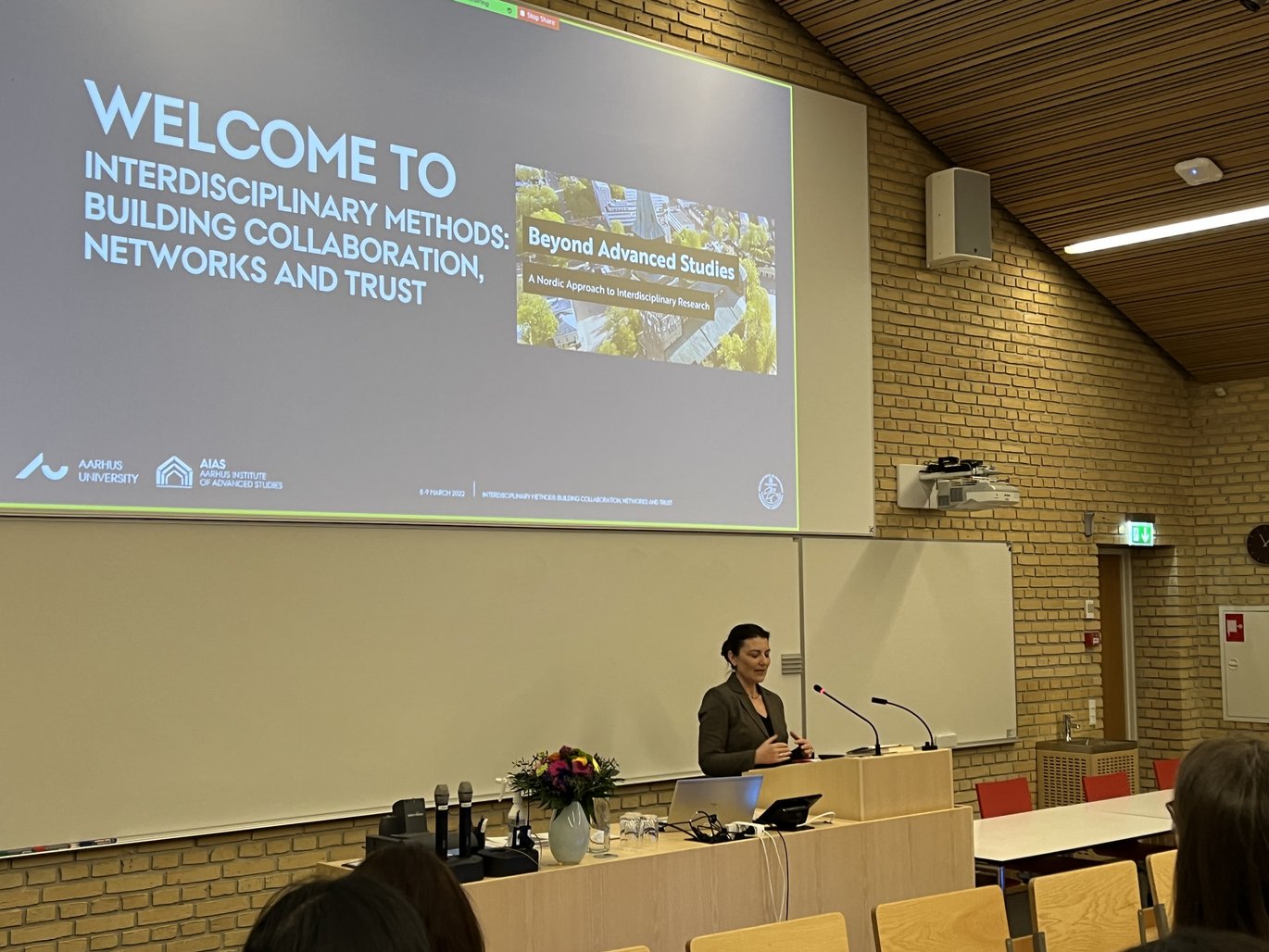Interdisciplinary Methods: Building collaboration, network and Trust
A two-day workshop at AIAS brought researchers, policy-makers, research management and industry together to discuss the methods of interdisciplinary collaboration in the Nordic countries.

To develop the concept of interdisciplinarity and strengthen collaboration in the Nordic countries a series of three workshops on the topic of interdisciplinarity have been organised by initiative of three Nordic Institutes for Advanced Study: The Swedish Collegium for Advanced Study (SCAS), Turku Institute for Advanced Studies (TIAS), Finland and Aarhus Institute for Advanced Studies (AIAS), Denmark.
On 8-9 March 2022, the second workshop of the series was held at AIAS, focusing on “Building Collaboration, Network and Trust.” Over two days, more than 70 people participated and 15 speakers presented their experiences with the challenges and benefits of interdisciplinary collaboration. This sparked intense conversations and ideas, and has already paved the way for ideas for future collaborations. Several talks addressed the discrepancy between how traditional university systems foster a strong individual researcher profile, and the strong need for an interdisciplinary approach and collaboration to address the many complex challenges in society and in research.
Missions Possible?
The opening talk was given by Professor Wilhelm Krull, director of the New Institute in Hamburg, and previous Secretary General for the Volkswagen Foundation, Germany. In his talk “Missions Possible,” Krull took a point of departure in his experience with change processes and bringing “impossible” cultures together e.g. in his work with the German unification in Research and Higher Education and South Africa‘s Research System in Transition. Krull emphasised the need for interdisciplinary, intergenerational and transsectoral collaboration to reach a high trust culture of research creativity and at the centre of this lies ‘courage.’
Invisible benefits and visible challenges
Mette Birkedal Bruun, Professor of Church History, Director of the Centre for Privacy Studies (University of Copenhagen) took the participants on an autobiographical tour of her research trajectory from a strong mono-disciplinary profile to branching out into several interdisciplinary projects. For Birkedal some of the ‘visible challenges’ of interdisciplinary projects are the difficulties of working together, of creating a recognizable scholarly profile and it is time-consuming. Whereas the ‘invisible benefits’ include scholarly agility, building network, fostering courage and avoiding academic isolation. Optimistically, Birkedal sees interdisciplinary collaboration as a forceful generator of driving basic research in new, including applied, directions.
Funding bodies - cross-council committees
Taking the funder’s perspective as panel chair in the Independent Research Fund Denmark, political scientist Søren Serritzlew (Aarhus University) asked in his talk: ‘Why is it so difficult to get interdisciplinary projects funded?‘ According to Serritzlew, interdisciplinary projects are hard for evaluators to understand as review committees are often mono-disciplinary, there is a sponsor problem and they are more difficult to fund. Serritzlew stressed that cross-council committees and feedback are crucial when assessing funding applications, and to meet the need for evaluating interdisciplinary projects properly one must rethink the structures of the funding evaluation process and panels.
More Than Pretty Pictures: Portable whiteboards, sofas and hard work
Four former AIAS Fellows gave short talks reflecting on their development of an interdisciplinary career. 2013-2016 AIAS Jens Christian Skou Fellow Lotte Philipsen from art history (Aarhus University) acknowledged the importance of time, space and a basic infrastructure as shared lunches, a portable whiteboard and the sofas to bring scholars together across academic backgrounds. An infrastructure that brought her in conversation with co-fellow, Nano scientist Rikke Schmidt Kjærgaard. Despite obstacles with understanding the language of the other’s academic field, with hard work and whiteboard explanations, they succeeded in organising a 3-day conference, More Than Pretty Pictures, on the aesthetics of scientific data representation. This conference resulted in a publication at Routledge, offering new insights on data visualisation by bringing the arts and natural sciences together.
Mission-driven research – interdisciplinary mind-set
As CEO of GreenLab, a green and circular energy park with power-to-X and a national research facility in Skive, Denmark, Christopher Sorensen works with mission-driven projects. For these he expressed an urgent call for bright minds with an interdisciplinary mind-set including people and knowledge from a broad spectrum of disciplines to make the circular economy and green transition happen, both in terms of technological developments and behavioural changes.
Building trust, building creativity
Where does the trust then enter the ‘interdisciplinary equation’? Building trust between scientists is fundamental for entering uncertain, uncomfortable grounds as e.g. in interdisciplinary collaborations. Trust requires clear roles, clear agreements, clear budgets, and clear institutional organization. To build creativity you should avoid homogeneity, but a collaboration can also be too heterogeneous, as experienced by Krull. Of importance is an acknowledging, open mindedness where ‘my colleague's success is not my loss,’ quoting Mette Birkedal.
Take risks, dare to fail, be courageous
During the different panel sessions, the incentive structures of universities were discussed. When these incentive structures for instance reward the number of peer-reviewed publications and citations, this leaves little time for deep thinking, curiosity, reading and reflection, and may hinder the courage of researchers to take risks and dare to fail.
Despite that interdisciplinary projects are time-consuming (double meetings, double communication), challenging in terms of overcoming and understanding differences and methods, in the long run they are very rewarding, offering new insights that may lead to new directions in research. As the current urgent crises, the pandemic and a war on the European continent, show, we need collaborations across scientific, institutional, political and cultural borders to overcome challenges.
The next workshop, Interdisciplinary Practice: Towards a Nordic Approach is held in Turku on 5-6 May 2022 at the Turku Institute for Advanced Studies (TIAS).
Know more about the collaboration between TIAS, SCAS and AIAS via:
https://sites.utu.fi/beyond-ias/
Contact
Søren Rud Keiding, AIAS Director, Professor
keiding@aias.au.dk
Phone: +45 28 99 20 61
Aarhus Institute of Advanced Studies, AIAS
Høegh-Guldbergs Gade 6B
DK-8000 Aarhus C
Denmark
